-
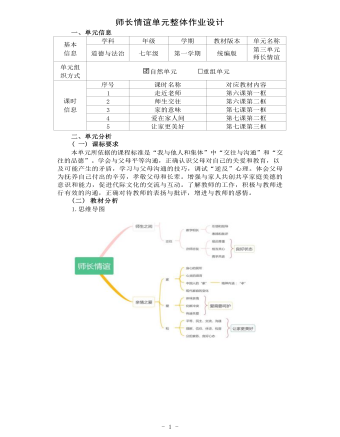
初中道德与法治七年级上册师长情谊作业设计
(2) 请你结合上述两幅漫画,对这一行为进行简要评析。15.某校七年级组织学生以“孝亲敬长”为主题开展手抄报评比活动。下面是某 同学手抄报的部分内容,请你阅读并参与完成相关问题。[我的感受]在人世间,最美的旅行是回家。无论走得多远,每个游子的心里也都有一个 归家的梦!回家的感觉真好!(1) 结合所学的知识,分析说明“回家真好”的原因是什么?[我的思考]调查显示:在当今家庭中,许多孩子不要父母过多干涉他们的学习和生活, 很多同龄人有被父母偷看过 QQ、微信聊天记录和日记的经历……(2) 针对调查显示的问题,你认为应怎样做才能处理好亲子之间的冲突?[我的鉴赏]人生最美好的事,莫过于我长大,你未老。我有能力报答,你仍然健康。父 母之爱,儿女即使用一辈子也是报答不完的。
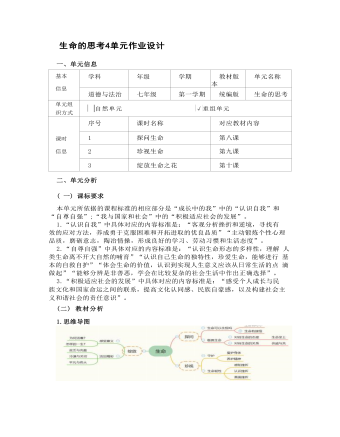
初中道德与法治七年级上册生命的思考4作业设计
①②③分析题干中,我们生命的意义不在于长短,而在于对社会的贡献,将个体生 命和国家的甚至人类的命运联系在一起时,生命就会闪耀出伟大,活出自己的精彩,让 生命更加绚烂,故①②③说法符合题意;④“追求生命个性和韧性”说法不符合主题故 ④说法错误;2.C【设计意图】该题考查呵护食品安全,珍爱生命。 ④说法虽然正确的,但是主体不符,不是市民的做法。故不能入选。 3.A【设计意图】本题考查对生命的传承。①②④材料中的话意在告诉我们,在人类生命的接续中,我们应该为自己的生命找 到一个位置,担当一份使命;在生命的传承关系中,我们应该正确认识和面对自己的生 命;我们每个人都不仅仅是在身体上接续祖先的生命,也在精神上不断继承和创造人类 的文明成果,故①②④说法正确;③生命属于我们每个人,生命的接续和发展与我们每 个人息息相关,故③说法错误。

初中道德与法治七年级上册师长情谊2作业设计
本单元内容是部编版《道德与法治》七年级上册第三单元,单元标题是“师 长情谊”,依据《义务教育道德与法治课程标准 (2022 年版) 》,围绕核心素 养确定的课程目标要求如下:1、道德修养家庭美德,践行以尊老爱幼、男女平等、勤劳节俭、邻里互助为主要内容的 道德要求,做家庭好成员。培育学生的道德修养,有助于他们经历从感性体验到理性认知的过程,传承 中华民族传统美德,形成健全的道德认知和道德情感,发展良好的道德行为。 2、健全人格理性平和,开放包容,理性表达意见,能够换位思考,学会处理与家庭、他 人的关系。3、总目标学生能够了解个人生活和公共生活中基本的道德要求和行为规范,能够在日常生 活中践行尊老爱幼等的道德要求;形成初步的道德认知和判断,能够明辨是非善 恶;通过体验、认知和践行,形成良好的道德品质。具有理性平和的心态,能够 建立良好的师生关系和家庭关系。
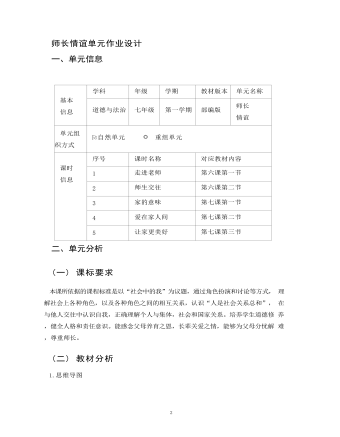
初中道德与法治七年级上册师长情谊8作业设计
(四) 作业分析与设计意图这是一项基于素质教育导向的整体式课时作业设计,以培育学生课程核心素 养为目标,为了培养学生的基本道德修养和社会责任感,养成良好的行为习惯, 作业以劳动活动的方式呈现,特开展“帮助父母做家务”社会实践活动。教师通 过学生活动成果的展示,从“计划合理,联系实际;操作具体,善于思考;记录 完整,汇报详细;总结全面,反思深刻”等 4个维度对作业进行评价,以“优秀” “良好”“合格”三个等级呈现。通过家务实践活动让学生体验到父母工作的辛 苦和劳动的光荣,感谢父母对自己无微不至的关怀和照顾。让学生在接受爱的同 时学会关爱,学会付出、学会回报,懂得孝亲敬长。这种劳动实践的作业设计与 实施,有利于推进中小学劳动教育,落实劳动教育指导纲要,保障劳动教育时间,创新劳动教育载体,拓展劳动教育实践场所,推动劳动教育常态化有效开展,充 分发挥劳动教育综合育人作用。增强学生的责任意识,在实际生活中能自觉分担 家庭责任,具有较强的责任感。
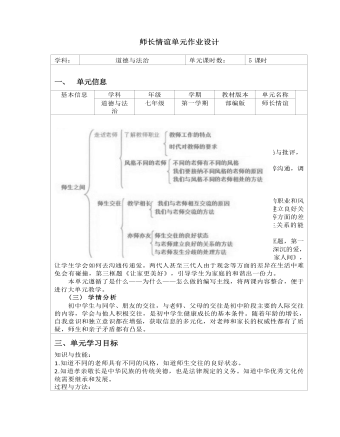
初中道德与法治七年级上册师长情谊4作业设计
作业 2:老师在与我们的交往中,扮演着组织者、倾听者、陪伴者的角色。作为学生,我 们要正确对待老师的表扬和批评。下列对此认识正确的是 ( )①老师的表扬意味着肯定、鼓励和期待②老师的表扬和批评能激励我们更好地学习和发展③老师的批评意味着关心、提醒和劝诫,可以帮助我们改进不足④对待老师的批评,我们要理解老师的良苦用心A.①②③ B.①③④ C.②③④ D.①②③④1.参考答案:D2.时间要求:2 分钟3.评价设计:本题学生错题的原因在于没有正确理解老师的批评和表扬。 4.作业分析与设计意图:本题考查如何正确看待老师的批评和表扬。(1) 老师的表扬意味着对我们的肯定、鼓励和期待;批评意味着老师对我们的关心、 提醒和劝诫,可以帮助我们改进不足,对待老师的批评,我们要理解老师的良苦用心。 (2) 老师的表扬和批评能激励我们更好地学习和发展,我们要正确地对待老师的表 扬和批评,被老师表扬不骄傲,受到批评也不气馁和抱怨,正视老师的教育,从而促 进良好师生关系的发展。
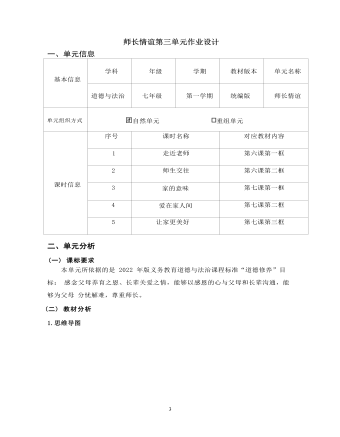
初中道德与法治七年级上册师长情谊5作业设计
2.内容内在逻辑本单元包括两课。 第六课设计了“走近老师”和“师生交往”两框内容。第一框通过 了解不同时期的老师,让学生从多层面、多角度认识老师这一职业群体;结合学生学 习实际,发现风格不同的老师,进一步引导学生学会接纳、尊重不同风格的老师,继 而建立对老师应有的正确“印象”;构建与老师良好交往的逻辑起点。第二框通过帮 助学生正确对待老师的引领与指导、表扬与批评以及与老师的矛盾与冲突,使学生认 识到亦师亦友的师生关系是师生交往的理想状态;并以实际行动与老师共建良好师生 关系,共度教育好时光。第七课设计了“家的意味” 、“爱在家人间”和“让家更美好”三框内容。第一框通过 引导学生联系已有的生活经验认识“家”是什么,结合对“家”及有关优秀的传统文化 进行探讨与分享,认识中国人的“家”是怎样的;在对“家”基本认知的前提下,第二 框进一步引导学生理解家的最本质内涵是“爱” ,并以实际行动去呵护“爱”;在对 “家”和“爱”的认知基础上,第三框进一步引导学生学会与家庭成员友好相处,从 而构建和谐的家庭关系,让家更美好。
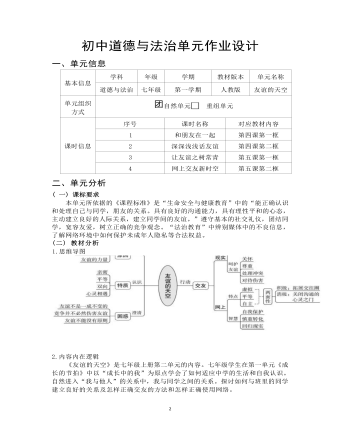
初中道德与法治七年级上册友谊的天空6作业设计
(四) 作业分析与设计意图通过本题引导学生认识到网上交友的积极影响,认识到网上交往的弊端和网 络交友应慎重,需要考虑对自己学习和生活的影响,学会理性辨别、慎重选择。 引导学生正确看待网上交友与现实交友。本题难度适中,领悟到材料意思,把握 书本重难点知识,即可做出正确选择。本题意在帮助中学生辩证认识网上交友给他们的生活带来的影响,既看到互 联网对交友的积极影响,也看到互联网对交友的消极影响;提示学生在网上交友 要具有自我保护意识,要慎重对待网上朋友转化为现实中的朋友;鼓励学生学会 在现实中与同伴交往。六、单元质量检测( 一) 单元质量检测内容一、单项选择题1.在友谊的长河里,我们深深浅浅地跋涉着,经历着不同的体验,积累着各自的 感受。检视自己对友谊的认识,下列观点正确的是 ( )A. 竞争必然伤友谊,要寻求合作避免竞争B. 学会接受友谊淡出,坦然接受新的友谊C. 朋友应相互帮助,考试递小抄可以理解D. 帮助朋友教训某人,哥们儿义气必不可少
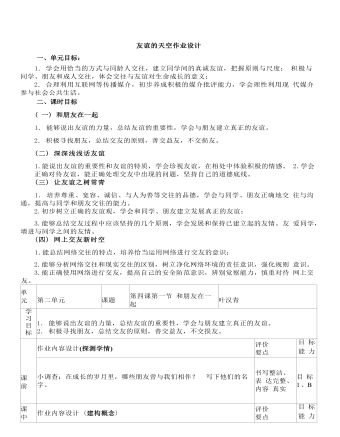
初中道德与法治七年级上册友谊的天空2作业设计
选择题1.打开网页,你可以看新闻、听音乐、玩游戏、交朋友、查资料、购 物、学习等。这从一个侧面说明了 ( )A.网络可以实现我们的一切愿望B.网络交往成为我们生活中不可缺少的部分C.网络生活很丰富D.网络交往是把锋利的双刃剑2. 只要上网,就等于与世界握手。看新闻,办商务、结交朋友、求医 问药、不用舟车劳顿,不用费事周折。这一切说明 ( )A.网络使交流便利,却使人的思想退化B.网络给了很多人可以偷懒的机会C.人们的交往都必须依赖于网络D.网络生活很丰富,网络沟通无极限非常方便、快捷。这说明 ( )A.网络交往超越了空间B.网络交往提高了人们社会活动的质量C.网络交往有利无弊D.网络交往改变了我们的人生价值4.比尔 ·盖茨曾说过:“你甚至不知道和你交流的对方是一条坐在电脑 前会敲击键盘的狗。 ”这说明 ( )3.在小明的众多网友中,有大学生、参加兴趣班的朋友、同学和老师。学习之余,他经常上网聊天;遇到问题,他会在网上向同学和老师请教,
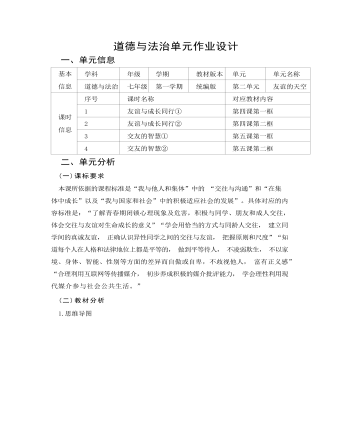
初中道德与法治七年级上册友谊的天空12作业设计
(一)课标要求在 2022 年课标中,要求学生能够与他人进行有效沟通。树立正确的合作与 竞争观念, 真诚、友善, 具有互助精神。 引导学生了解积极交往的意义, 树立主 动交往意识, 积极树立以同情、关爱、道义为基础的友谊。引导学生在交往中积 极践行真诚、友善和互助精神, 提高交往能力,学会处理与自我、他人和集体、 国家和社会等方面关系, 营造良好和谐的人际关系。 了解青春期闭锁心理现象及 危害, 积极与同学、朋友和成人交往, 体会交往与友谊对生命成长的意义。学会 用恰当的方式与同龄人交往, 建立同学间的真诚友谊, 正确认识异性同学之间的 交往与友谊, 把握原则与尺度。知道每个人在人格和法律地位上都是平等的, 做 到平等待人, 不凌弱欺生, 不以家境、身体、智能、性别等方面的差异而自傲或 自卑, 不歧视他人, 富有正义感。合理利用互联网等传播媒介, 初步养成积极的 媒介批评能力,学会理性利用现代媒介参与社会公共生活。

初中道德与法治七年级上册友谊的天空4作业设计
(1) 请结合所学知识,谈谈你对“幸福、幸运”的理解。【看法二】小李:“我最近和好朋友发生了矛盾,考试时他问我答案,我拒绝 了他,他很生气。拒绝给他答案,我这样做是不是做错了?我感觉我们两个 人已经渐行渐远了,我该怎么办?”(2) 面对小李的苦恼,你会如何开导、安慰他?【看法三】小王:“我身边很多同学都是通过送礼物、花钱请吃饭来巩固友情 的,要不我也模仿他们吧。”(3) 花钱请客吃饭能买到真正的友谊吗?请运用所学知识谈谈你的理解。12. (原创题)阅读材料,回答下列问题。七年级学生肖楠在交友遇到了很多困扰:困扰一:我发现好朋友小鹏愁眉苦脸,关心地上前询问原因,可小鹏怎么也 不肯说,还对我很不耐烦。困扰二:我和网友轻舞飞扬在网上认识一年多,很投缘,他想要我的照片, 想知道我的姓名、学校、家庭住址等信息,还想约我周末见面。
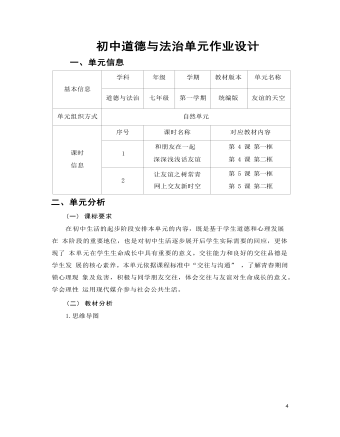
初中道德与法治七年级上册友谊的天空14作业设计
A.因为朋友,我们感受到自己的价值B.因为朋友,我们感受到友谊的力量C.因为朋友,我们获得了更多的荣誉D.因为朋友,我们会乐于并尝试学习9.朋友之间需要忠诚和信任,但是,这并不意味着朋友之间就应该毫无保留。我们关心和帮助朋友,但不要替朋友作决定。由此可见 ( )A.呵护友谊,需要给对方一些空间B.呵护友谊,需要用心体会对方的需要C.冲突发生时,要相互协调和宽容D.友谊的力量让我们得到健康的成长10.七年级的乐乐同学迷上网络游戏后,学习成绩一落千丈。他从此变得孤僻,不爱说话,易发脾气。后来,他的同桌亮亮与他交往,和他做朋友,他们经 常一起做作业、讨论问题,一起打球。乐乐慢慢远离网络游戏,学习勤奋了,有进步了,性格变得开朗了。这一事例表明 ( )A.友谊帮助我们认识和改正自己言行中的缺失,使人进步B.友谊使人远离网络C.朋友可以改变人的一切D.朋友使我们对任何事情都敢去尝试
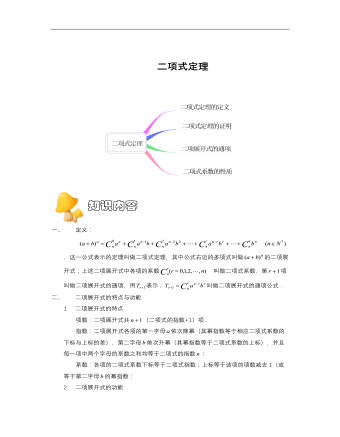
【高教版】中职数学拓展模块:3.2《二项式定理》教学设计
一、定义: ,这一公式表示的定理叫做二项式定理,其中公式右边的多项式叫做的二项展开式;上述二项展开式中各项的系数 叫做二项式系数,第项叫做二项展开式的通项,用表示;叫做二项展开式的通项公式.二、二项展开式的特点与功能1. 二项展开式的特点项数:二项展开式共(二项式的指数+1)项;指数:二项展开式各项的第一字母依次降幂(其幂指数等于相应二项式系数的下标与上标的差),第二字母依次升幂(其幂指数等于二项式系数的上标),并且每一项中两个字母的系数之和均等于二项式的指数;系数:各项的二项式系数下标等于二项式指数;上标等于该项的项数减去1(或等于第二字母的幂指数;2. 二项展开式的功能注意到二项展开式的各项均含有不同的组合数,若赋予a,b不同的取值,则二项式展开式演变成一个组合恒等式.因此,揭示二项式定理的恒等式为组合恒等式的“母函数”,它是解决组合多项式问题的原始依据.又注意到在的二项展开式中,若将各项中组合数以外的因子视为这一组合数的系数,则易见展开式中各组合数的系数依次成等比数列.因此,解决组合数的系数依次成等比数列的求值或证明问题,二项式公式也是不可或缺的理论依据.
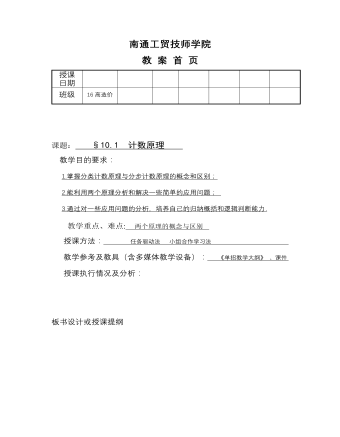
高教版中职数学基础模块下册:10.1《计数原理》教学设计
授课 日期 班级16高造价 课题: §10.1 计数原理 教学目的要求: 1.掌握分类计数原理与分步计数原理的概念和区别; 2.能利用两个原理分析和解决一些简单的应用问题; 3.通过对一些应用问题的分析,培养自己的归纳概括和逻辑判断能力. 教学重点、难点: 两个原理的概念与区别 授课方法: 任务驱动法 小组合作学习法 教学参考及教具(含多媒体教学设备): 《单招教学大纲》、课件 授课执行情况及分析: 板书设计或授课提纲 §10.1 计数原理 1、加法原理 2、乘法原理 3、两个原理的区别
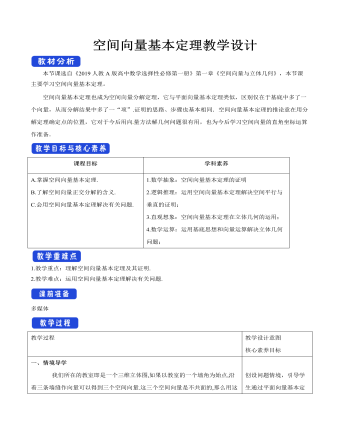
空间向量基本定理教学设计人教A版高中数学选择性必修第一册
反思感悟用基底表示空间向量的解题策略1.空间中,任一向量都可以用一个基底表示,且只要基底确定,则表示形式是唯一的.2.用基底表示空间向量时,一般要结合图形,运用向量加法、减法的平行四边形法则、三角形法则,以及数乘向量的运算法则,逐步向基向量过渡,直至全部用基向量表示.3.在空间几何体中选择基底时,通常选取公共起点最集中的向量或关系最明确的向量作为基底,例如,在正方体、长方体、平行六面体、四面体中,一般选用从同一顶点出发的三条棱所对应的向量作为基底.例2.在棱长为2的正方体ABCD-A1B1C1D1中,E,F分别是DD1,BD的中点,点G在棱CD上,且CG=1/3 CD(1)证明:EF⊥B1C;(2)求EF与C1G所成角的余弦值.思路分析选择一个空间基底,将(EF) ?,(B_1 C) ?,(C_1 G) ?用基向量表示.(1)证明(EF) ?·(B_1 C) ?=0即可;(2)求(EF) ?与(C_1 G) ?夹角的余弦值即可.(1)证明:设(DA) ?=i,(DC) ?=j,(DD_1 ) ?=k,则{i,j,k}构成空间的一个正交基底.
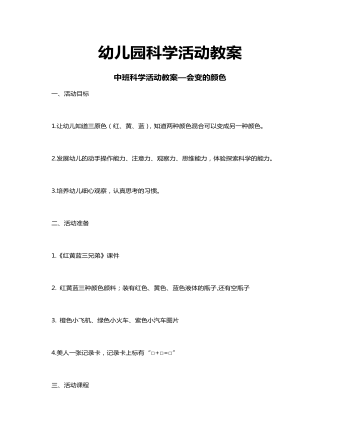
幼儿园科学活动教案
二、活动准备 1.《红黄蓝三兄弟》课件 2.红黄蓝三种颜色颜料;装有红色、黄色、蓝色液体的瓶子,还有空瓶子 3.橙色小飞机、绿色小火车、紫色小汽车图片 4.美人一张记录卡,记录卡上标有“□+□=□”
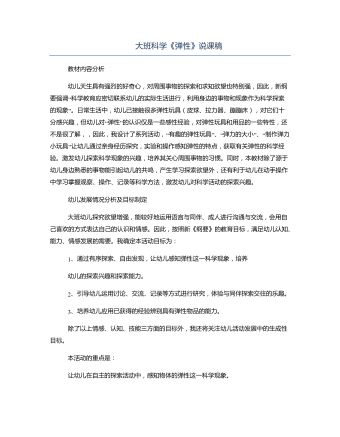
大班科学《弹性》说课稿
幼儿天生具有强烈的好奇心,对周围事物的探索和求知欲望也特别强,因此,新纲要强调“科学教育应密切联系幼儿的实际生活进行,利用身边的事物和现象作为科学探索的现象”。日常生活中,幼儿已接触很多弹性玩具(皮球、拉力器、蹦蹦床),对它们十分感兴趣,但幼儿对“弹性”的认识仅是一些感性经验,对弹性玩具和用品的一些特性,还不是很了解,,因此,我设计了系列活动,“有趣的弹性玩具”、“弹力的大小”、“制作弹力小玩具”让幼儿通过亲身经历探究,实验和操作感知弹性的特点,获取有关弹性的科学经验。激发幼儿探索科学现象的兴趣,培养其关心周围事物的习惯。同时,本教材除了源于幼儿身边熟悉的事物能引起幼儿的共鸣,产生学习探索欲望外,还有利于幼儿在动手操作中学习掌握观察、操作、记录等科学方法,激发幼儿对科学活动的探索兴趣。
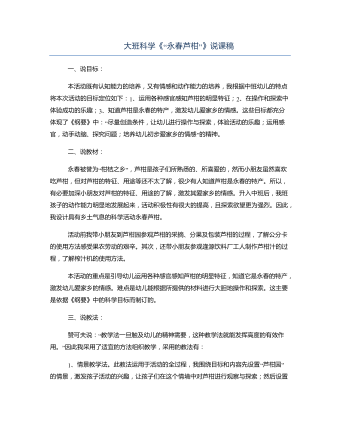
大班科学《“永春芦柑”》说课稿
永春被誉为“柑桔之乡”,芦柑是孩子们所熟悉的、所喜爱的,然而小朋友虽然喜欢吃芦柑,但对芦柑的特征、用途等还不太了解,很少有人知道芦柑是永春的特产。所以,有必要加深小朋友对芦柑的特征、用途的了解,激发其爱家乡的情感。升入中班后,我班孩子的动作能力明显地发展起来,活动积极性有很大的提高,且探索欲望更为强烈。因此,我设计具有乡土气息的科学活动永春芦柑。活动前我带小朋友到芦柑园参观芦柑的采摘、分果及包装芦柑的过程,了解公分卡的使用方法感受果农劳动的艰辛。其次,还带小朋友参观逢源饮料厂工人制作芦柑汁的过程,了解榨汁机的使用方法。本活动的重点是引导幼儿运用各种感官感知芦柑的明显特征,知道它是永春的特产,激发幼儿爱家乡的情感。难点是幼儿能根据所提供的材料进行大胆地操作和探索。这主要是依据《纲要》中的科学目标而制订的。
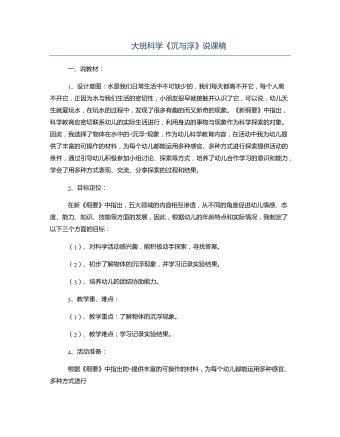
大班科学《沉与浮》说课稿
水是我们日常生活中不可缺少的,我们每天都离不开它,每个人离不开它,正因为水与我们生活的密切性,小朋友很早就接触并认识了它,可以说,幼儿天生就爱玩水,在玩水的过程中,发现了很多有趣的而又新奇的现象。《新纲要》中指出,科学教育应密切联系幼儿的实际生活进行,利用身边的事物与现象作为科学探索的对象。因此,我选择了物体在水中的“沉浮”现象,作为幼儿科学教育内容,在活动中我为幼儿提供了丰富的可操作的材料,为每个幼儿都能运用多种感官、多种方式进行探索提供活动的条件,通过引导幼儿积极参加小组讨论、探索等方式,培养了幼儿合作学习的意识和能力,学会了用多种方式表现、交流、分享探索的过程和结果。在新《纲要》中指出,五大领域的内容相互渗透,从不同的角度促进幼儿情感、态度、能力、知识、技能等方面的发展,因此,根据幼儿的年龄特点和实际情况,我制定了以下三个方面的目标:(1)、对科学活动感兴趣,能积极动手探索,寻找答案。(2)、初步了解物体的沉浮现象,并学习记录实验结果。(3)、培养幼儿的团结协助能力。
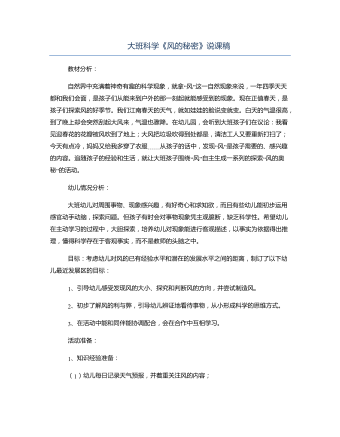
大班科学《风的秘密》说课稿
自然界中充满着神奇有趣的科学现象,就拿“风”这一自然现象来说,一年四季天天都和我们会面,是孩子们从能来到户外的那一刻起就能感受到的现象。现在正值春天,是孩子们探索风的好季节。我们江南春天的天气,就如娃娃的脸说变就变。白天的气温很高,到了晚上却会突然刮起大风来,气温也骤降。在幼儿园,会听到大班孩子们在议论:我看见迎春花的花瓣被风吹到了地上;大风把垃圾吹得到处都是,清洁工人又要重新打扫了;今天有点冷,妈妈又给我多穿了衣服……从孩子的话中,发现“风”是孩子需要的、感兴趣的内容。追随孩子的经验和生活,就让大班孩子围绕“风”自主生成一系列的探索“风的奥秘”的活动。大班幼儿对周围事物、现象感兴趣,有好奇心和求知欲,而且有些幼儿能初步运用感官动手动脑,探索问题。但孩子有时会对事物现象凭主观臆断,缺乏科学性。希望幼儿在主动学习的过程中,大胆探索,培养幼儿对现象能进行客观描述,以事实为依据得出推理,懂得科学存在于客观事实,而不是教师的头脑之中。
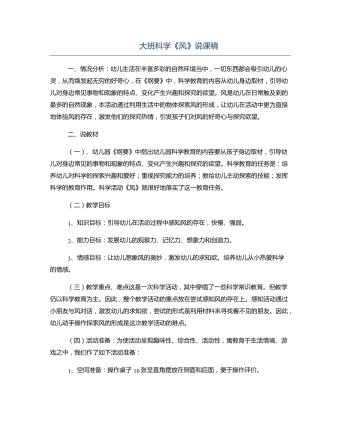
大班科学《风》说课稿
幼儿生活在丰富多彩的自然环境当中,一切东西都会吸引幼儿的心灵,从而焕发起无穷的好奇心,在《纲要》中,科学教育的内容从幼儿身边取材,引导幼儿对身边常见事物和现象的特点、变化产生兴趣和探究的欲望。风是幼儿在日常触及到的最多的自然现象,本活动通过利用生活中的物体探索风的形成,让幼儿在活动中更为直接地体验风的存在,激发他们的探究热情,引发孩子们对风的好奇心与探究欲望。幼儿园《纲要》中指出幼儿园科学教育的内容要从孩子身边取材,引导幼儿对身边常见的事物和现象的特点、变化产生兴趣和探究的欲望。科学教育的任务是:培养幼儿对科学的探索兴趣和爱好;重视探究能力的培养;教给幼儿主动探索的技能;发挥科学的教育作用。科学活动《风》就很好地落实了这一教育任务。

